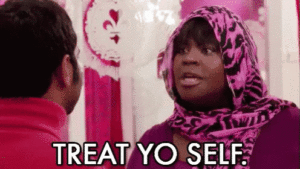A few weeks back I came across a video of a guy that put a giant ball pit downtown New York City to see if people were too busy to have fun. On that same day, I had a conversation with my fiance about how I always have a million things on my mind at once. None of which are ever fun things. It’s more like a chore list that constantly runs through my mind.
To say the least, I am constantly stressed and feel like I am moving a million miles an hour without time to breathe. What stresses me out the most, is that I don’t have time for me. I don’t have time for fun. And I’m only 22! Is this how the rest of my adult life is supposed be?
My fiance asked me what things I want to do aside from completing things on my chore list. What do I want to do for me?
It made me think. There are a lot of things that I would love to do. I can’t remember the last time I did something for myself or even spent decent quality time with my family.
And why?
Because I am always to “busy”. Busy prioritizing the needs of everyone and everything except for myself. It brought me to question why we as humans get so caught up in all of these other things and forget about ourselves. Do we really not have five minutes out of our day for ourselves? Five minutes for fun?
I’m sure that I am not the first person to ever get caught up trying to keep up with the speed of life and as a result let my own enjoyment fall off the wagon.
The question is, how can we bring that enjoyment, the fun, back into our lives?
It’s really up to us to prioritize it. We are responsible for our lives and how we run them. For people like myself, we need to start saying no to things that can wait and start putting fun first. We need to say, “yes,” to that vacation we so badly need. “Yes” to drinks after work. “Yes” to catching up with friends. Work and house chores will still be there tomorrow.
I am not saying throw all of our responsibilities out the window and run wild. I just mean we need to do something for our own enjoyment every once and a while.
It’s also up to employers to encourage their employees to unplug and have a healthy life outside of work. Below 10 things that employers can do to help employees prioritize themselves without feeling major guilt.
- Don’t allow employees to have their work email on their phones.
- Don’t call employees or expect them to respond to emails after hours or on their days off.
- Require that employees leave the office for at least half of their lunch hour.
- Offer work from home days.
- Offer flexible work hours.
- Make the workday shorter by a half an hour.
- Don’t require employees to take PTO for appointments.
- Have fun at work. Throw office potlucks, cookouts, or go for a group walk.
- Have team outings.
- Don’t let that ping pong table in the office get dusty. Encourage employees to take at least 10 minutes out of their day to play a game and give their brain a break to recharge.
Ask yourself, are you too busy to have fun? If the answer is yes, it may be time to re-think your priorities.
 Hallie Priest is a digital marketer for HRU Technical Resources, a leading engineering and IT staffing firm based in Lansing, MI, using her skills to create content to serve all involved in the job seeking/hiring process. When she is not strategizing campaigns, going over analytics, or talking about her dog you can find her at the nearest coffee shop fueling her creativity. Connect with her on LinkedIn: www.linkedin.com/in/halliepriest
Hallie Priest is a digital marketer for HRU Technical Resources, a leading engineering and IT staffing firm based in Lansing, MI, using her skills to create content to serve all involved in the job seeking/hiring process. When she is not strategizing campaigns, going over analytics, or talking about her dog you can find her at the nearest coffee shop fueling her creativity. Connect with her on LinkedIn: www.linkedin.com/in/halliepriest










